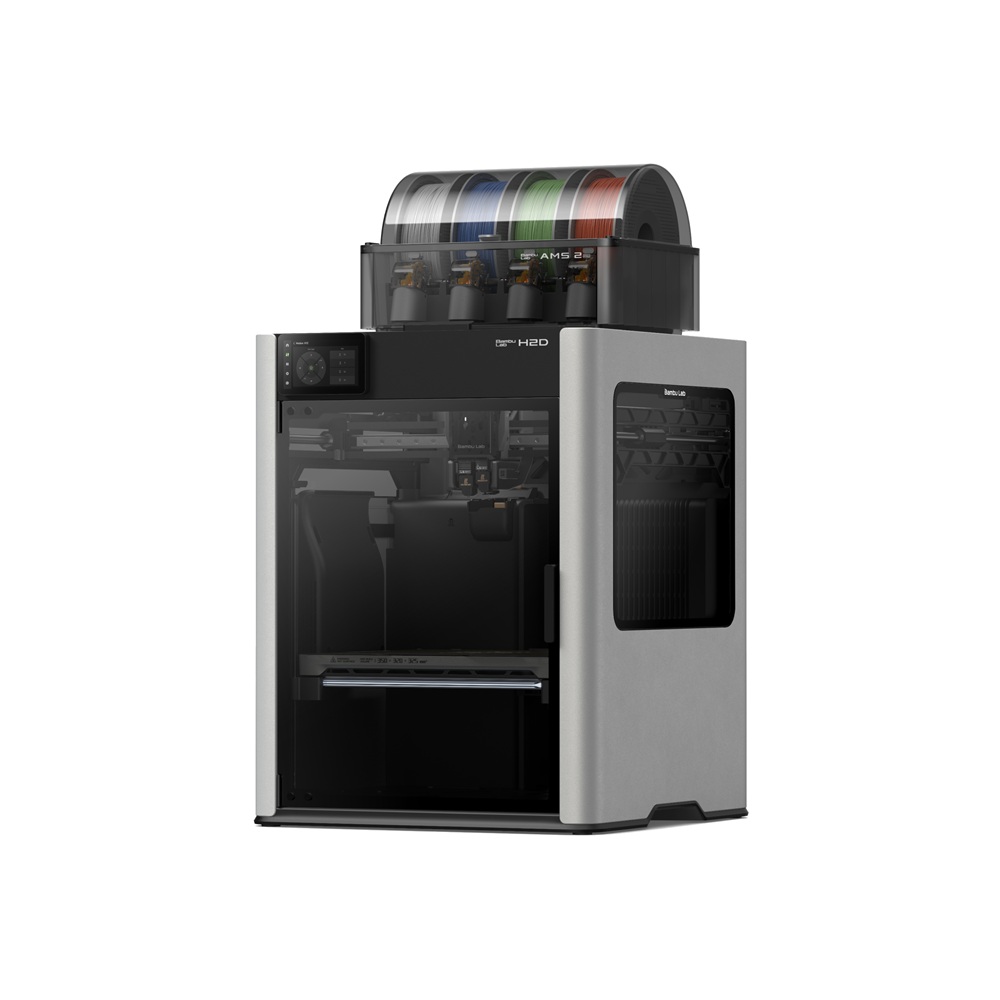Compare H2D vs KP3S PRO V2
Comparison between the best 3D printers
Choose the best 3D printer at the best price. The cheapest 3D printers are here.
Buy a 3D printer here with 3D Fila.
 |
 |
|
| Model | H2D |
KP3S PRO V2 |
| Printing Material | Filament | Filament |
| Buy Filament for Bambu Lab H2D | Buy Filament forKingroon KP3S PRO V2 | |
| Estimated price | $1899,00 | $229,00 |
| Manufacturer | Bambu Lab | Kingroon |
| Release Year | 2025 | 2024 |
| Print Volume [mm] | 350x320x325 | 220x220x250 |
| Printer Size [mm] | 492x514x626 | 420x400x450 |
| Weight [kg] | 42,3 | 12,6 |
| Power Loss Recovery | YES | NO |
| Enclosed printer | YES | NO |
| Bed Leveling | Automatic | Automatic |
| Filament End Sensor | YES | NO |
| Bed type | Heated | Heated |
| Power supply system | Direct Drive | Direct Drive |
| Standard nozzle | 0,4 | 0,4 |
| Maximum Nozzle Temperature [°C] | 350 | 260 |
| Maximum Bed Temperature [°C] | 120 | 100 |
| Maximum printing speed [mm/s] | 600 | 350 |
| Filament holder | YES | YES |
| Camera for supervision | YES | YES |
| Recommended filaments | PLA, PETG, ABS, ASA, TPU, PVA, Nylon (PA) | PLA, PETG, TPU |
| Recommended slicers | Bambu Studio | Cura, Orca Slicer |
| Maximum Resolution [mm] | 0,01 | 0,01 |
| Processor | ||
| Display | Touchscreen 5'' | LCD Mono |
| Power Supply | 300 W | |
| Connectivity | Wifi, Bambu bus, Cartão SD | USB-C / MicroSD / Ethernet |
| Operating systems | Windows, Mac, Linux | Windows, Mac, Linux |
| Date of registration in the system | 2025-03-31 | 2025-03-18 |
| Release date | 2025 | 2024 |
| Extra features | Bambu Labs H2D combines high-speed 3D printing with a chamber heated up to 65 °C, dual extrusion with automatic nozzle switching, an AMS for filament drying and exchange, and AI sensors that detect failures. It offers optional laser and digital cutting capabilities, features intelligent calibration through computer vision, vibration control, enhanced fire safety, and real-time camera monitoring. | The Kingroon KP3S Pro V2 is a high-speed FDM 3D printer with Klipper firmware, ensuring fast and precise prints. It features linear rails on all axes, a Direct Drive extruder with a 9.5:1 gear ratio, and an efficient ceramic heater. It includes an inductive sensor for automatic bed leveling, a PEI magnetic bed, a built-in accelerometer for vibration calibration, and Wi-Fi, Ethernet, and USB connectivity for remote control. |
| Support for multiple colors and materials (AMS and CFS) | YES | NO |
Notes * |
||
| Cost-benefit | 7 / 10 | 7 / 10 |
| Hardware | 7.2 / 10 | 0.8 / 10 |
| Tela | . | . |
| Print volume | 4 / 10 | 3 / 10 |
| Performance | 5 / 10 | 3 / 10 |
Conclusion |
| In conclusion, the comparison between the Bambu Lab H2D and the Kingroon KP3S Pro V2 highlights a significant contrast in features, performance, and price. The H2D, positioned as a premium option, offers advanced capabilities such as a larger print volume, higher maximum nozzle and bed temperatures, automatic failure detection, and enhanced safety features. Its enclosed design and dual extrusion capabilities make it suitable for a wider range of materials, appealing to professionals and enthusiasts who prioritize quality and functionality in their 3D printing projects. On the other hand, the KP3S Pro V2 serves as a more budget-friendly alternative, providing solid performance for hobbyists and those new to 3D printing. While it may lack some of the advanced features found in the H2D, such as power loss recovery and filament monitoring, it still offers rapid printing speeds and reliable results using popular filaments. Ultimately, the choice between the two models comes down to the user's needs and budget. For those who require professional-level features and are willing to invest more, the H2D stands out as an excellent option. Conversely, the KP3S Pro V2 represents a cost-effective solution for users looking for a capable 3D printer without the premium price tag. |

